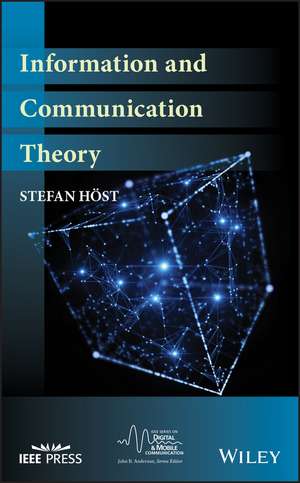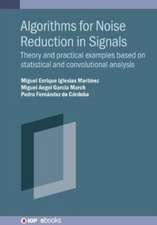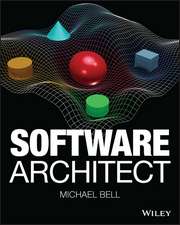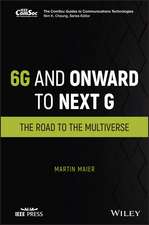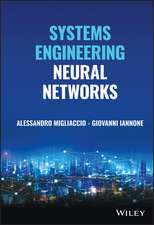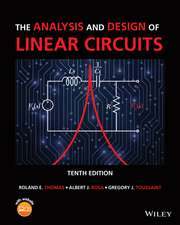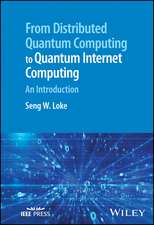Information and Communication Theory: IEEE Series on Digital & Mobile Communication
Autor S Hösten Limba Engleză Hardback – 20 mai 2019
Din seria IEEE Series on Digital & Mobile Communication
- 23%
 Preț: 908.36 lei
Preț: 908.36 lei - 9%
 Preț: 1229.67 lei
Preț: 1229.67 lei - 9%
 Preț: 866.27 lei
Preț: 866.27 lei - 9%
 Preț: 1025.62 lei
Preț: 1025.62 lei - 9%
 Preț: 895.18 lei
Preț: 895.18 lei - 9%
 Preț: 760.60 lei
Preț: 760.60 lei - 9%
 Preț: 756.55 lei
Preț: 756.55 lei - 9%
 Preț: 956.00 lei
Preț: 956.00 lei - 9%
 Preț: 853.31 lei
Preț: 853.31 lei - 9%
 Preț: 723.85 lei
Preț: 723.85 lei - 9%
 Preț: 702.24 lei
Preț: 702.24 lei - 9%
 Preț: 880.28 lei
Preț: 880.28 lei - 9%
 Preț: 703.93 lei
Preț: 703.93 lei - 27%
 Preț: 820.09 lei
Preț: 820.09 lei - 27%
 Preț: 858.62 lei
Preț: 858.62 lei - 31%
 Preț: 1223.76 lei
Preț: 1223.76 lei - 32%
 Preț: 746.34 lei
Preț: 746.34 lei - 32%
 Preț: 578.15 lei
Preț: 578.15 lei - 32%
 Preț: 718.42 lei
Preț: 718.42 lei - 30%
 Preț: 821.01 lei
Preț: 821.01 lei - 32%
 Preț: 430.69 lei
Preț: 430.69 lei - 32%
 Preț: 641.03 lei
Preț: 641.03 lei - 31%
 Preț: 606.27 lei
Preț: 606.27 lei - 33%
 Preț: 653.87 lei
Preț: 653.87 lei
Preț: 737.76 lei
Preț vechi: 1010.63 lei
-27% Nou
Puncte Express: 1107
Preț estimativ în valută:
141.17€ • 147.39$ • 116.84£
141.17€ • 147.39$ • 116.84£
Carte tipărită la comandă
Livrare economică 05-19 aprilie
Preluare comenzi: 021 569.72.76
Specificații
ISBN-13: 9781119433781
ISBN-10: 1119433789
Pagini: 368
Dimensiuni: 161 x 234 x 22 mm
Greutate: 0.75 kg
Editura: Wiley
Seria IEEE Series on Digital & Mobile Communication
Locul publicării:Hoboken, United States
ISBN-10: 1119433789
Pagini: 368
Dimensiuni: 161 x 234 x 22 mm
Greutate: 0.75 kg
Editura: Wiley
Seria IEEE Series on Digital & Mobile Communication
Locul publicării:Hoboken, United States
Notă biografică
STEFAN HÖST is a Senior Lecturer in the Department of Electrical and Information Technology at Lund University, where he is active in the Broadband Communication research group. As a teacher he has been responsible for several courses within communication technology at the master's level. His main research area is within access networks seen from the physical layer. He is a frequent contributor to IEEE journals and to papers presented at multiple IEEE conferences.
Cuprins
Preface ix Chapter 1 Introduction 1 Chapter 2 Probability Theory 5 2.1 Probabilities 5 2.2 Random Variable 7 2.3 Expectation and Variance 9 2.4 The Law of Large Numbers 17 2.5 Jensen's Inequality 21 2.6 Random Processes 25 2.7 Markov Process 28 Problems 33 Chapter 3 Information Measures 37 3.1 Information 37 3.2 Entropy 41 3.3 Mutual Information 48 3.4 Entropy of Sequences 58 Problems 63 Chapter 4 Optimal Source Coding 69 4.1 Source Coding 69 4.2 Kraft Inequality 71 4.3 Optimal Codeword Length 80 4.4 Huffman Coding 84 4.5 Arithmetic Coding 95 Problems 101 Chapter 5 Adaptive Source Coding 105 5.1 The Problem with Unknown Source Statistics 105 5.2 Adaptive Huffman Coding 106 5.3 The Lempel-Ziv Algorithms 112 5.4 Applications of Source Coding 125 Problems 129 Chapter 6 Asymptotic Equipartition Property and Channel Capacity 133 6.1 Asymptotic Equipartition Property 133 6.2 Source Coding Theorem 138 6.3 Channel Coding 141 6.4 Channel Coding Theorem 144 6.5 Derivation of Channel Capacity for DMC 155 Problems 164 Chapter 7 Channel Coding 169 7.1 Error-Correcting Block Codes 170 7.2 Convolutional Code 188 7.3 Error-Detecting Codes 203 Problems 210 Chapter 8 Information Measures For Continuous Variables 213 8.1 Differential Entropy and Mutual Information 213 8.2 Gaussian Distribution 224 Problems 232 Chapter 9 Gaussian Channel 237 9.1 Gaussian Channel 237 9.2 Parallel Gaussian Channels 244 9.3 Fundamental Shannon Limit 256 Problems 260 Chapter 10 Discrete Input Gaussian Channel 265 10.1 M-PAM Signaling 265 10.2 A Note on Dimensionality 271 10.3 Shaping Gain 276 10.4 SNR Gap 281 Problems 285 Chapter 11 Information Theory and Distortion 289 11.1 Rate-Distortion Function 289 11.2 Limit For Fix Pb 300 11.3 Quantization 302 11.4 Transform Coding 306 Problems 319 Appendix A Probability Distributions 323 A.1 Discrete Distributions 323 A.2 Continuous Distributions 327 Appendix B Sampling Theorem 337 B.1 The Sampling Theorem 337 Bibliography 343 Index 347
